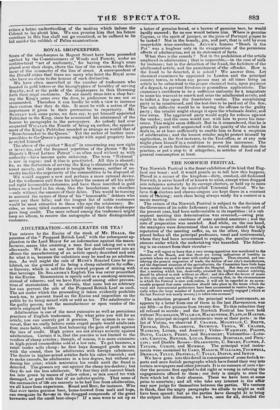ROYAL SHOPKEEPERS.
Sotte of the shopkeepers in Regent Street have been proceeded against by the Commissioners of 'Woods and Forests, under an architectural "act of uniformity," for having the King's arms placed over their shops, above the line of the cornice, to the detri- ment of the symmetry of the line of street. A correspondent of the Herald states that there arc many who hoist the Royal arms who have no claim to the honour of such distinction.
We have often marvelled at the number of tradesmen who boasted in gold letters or the hieroglyphics of heraldry of serving Royalty, and at the pride of the shopkeepers in thus blazoning forth their regal customers. No one surely steps into a shop hav- ing the King's arms over the door, in preference to one not so ornamented. Therefore it can hardly be with a view to increase their custom that they do this. It must be with a notion of the importance it gives to their pretensions, to superiority. Mr. BENTLEY took some pains, we dare say, to get himself appointed Publisher to the King, since he announced his attainment of the honour by paragraphs in the newspapers. As nobody had ever , suspected WILLIAM the Fourth of being ate author, the appoint- ment of the King's Publisher tounded as strange as would that of "Breecheemaker to the Queen." Yet the maker of leather inex- pressibles to the Queen's grooms might with equal propriety have so styled himself. The abuse of the epithet "Royal" in announcing any new sight or inveneion, and the frequent repetition of the phrase "By his Majesty's Royal Letters Patent"—as often used without as with authority—have become quite sickening. The term "National" is now in vogue; and it also is prostituted. All this is absurd; for, as the distinction of serving the King is obtained through in- terest merely, and the patent is bought by money, neither of ne- cessity implies the superiority of' the commodities to be disposed of. We would suggest a new and perhaps a more rational device. Let the tradesman cull from his ledger the names of all his noble and right honourable customers, and have them inscribed in gold letters on a board in his shop, like the benefactions in churches —only without the amount of their debts. This would be turning to account the names of those of his " honourable " debtors who never pay their bills; and the longest list of noble customers would be most attractive to those who ape the aristocracy. Be- sides, so many titled customers would imply that the shopkeeper gave long credit. The more refined among the tradesmen might keep an album, to receive the autographs of their distinguished customers.






















 Previous page
Previous page